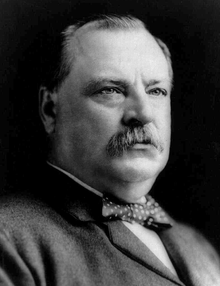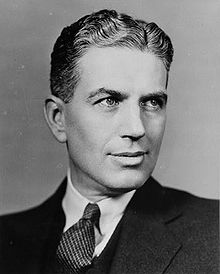After reading the condescending remarks about William Jennings Bryan’s lack of presidential intellect it was amusing to read this study of two-term president Cleveland who was Bryan’s exact contemporary. Bryan got by with the Bible for reading, Cleveland’s horizon did extend even that far. He never read a book and never opened an atlas. Never left the United States, and only made one trip around the country when president. For a politician he was nearly anti-social.
Grover Cleveland (1837-1908) was the 22nd (1885-1889) and 24th (1893-1897) President and it seems he was one of the very least prepared for the office, yet he won the popular vote three times, though was only elected twice. To date he is the only president to win two terms separated by another president. That is, until Jimmie Carter makes a comeback!

Though the author is sympathetic to Cleveland, it is apparent that Cleveland was pedestrian, imperceptive, slow, cumbersome, inept, ignorant, and uncommunicative. Still he did win, the second time defeating the incumbent (Harrison), which is never easy. The first victory made him the first Democrat elected since 1856, and that was not easy either. The Democrats dominated the Old South before the Civil War, the post-war Republicans wrapped themselves in a bloody shirt and tied the Democrats to the war. It took a generation for that opprobrium to erode.
What Cleveland did have in plenty was personal honesty and unrelenting belief that if only honesty prevailed, that would be enough. He exercised this political dictum as mayor of Buffalo and then governor of New York by vetoing noxious legislation from the hosts of corrupt legislators that typified American politics at the time. He was known as Mayor Veto and then Governor Veto. The corruption in American politics at this time beggars belief, but believe we must. Like Woodrow Wilson later, Cleveland went from governor to president in less than two years, after less than one year as mayor of Buffalo.
Cleveland’s first trip outside New York State was when he went to Washington to take the oath of office. He found there a much more complicated situation with regional, class, party, intra-party, personal rivalries criss-crossing in a bewildering array of vectors. It was not often easy to tell what the honest thing to do was, and even when it was done, it was seldom enough.
He never did understand the economy regarding tariffs and taxation, nor did he do any better in grasping the relationship of gold to the dollar, instead he just dug in to maintain the status quo. This Democrat sided with the union-busters, and sent troops to smash strikes more than once, since the strikers were breaking the law.
He was a draft dodger in the Civil War and supported an illegitimate child, yet he was elected. His reputation for personal honesty, which included readily acknowledging these two deeds, attracted votes. The Karl Roves of the day never tired of throwing these sins in his face, and adding a great of fiction to them, which was broadcast by the ever compliant press. Some things do not change.
It was the time of the Robber Barons who owned the very air 99% of the population breathed; the Barons were secure behind a tariff wall that supported the 1% of owners at the ever increasing expense of the rest. Jay Gould, Andrew Carnegie, Cornelius Vanderbilt, John Jacob Astor, J. Pierpont Morgan were only the most well known of the gang. They bought Congressman and Senators as necessary, and presidents, too. Political machines, Democrat and Republican, turned out the vote and often accommodated each other to keep a stable relationship. Tammany Hall was the most visible of these contraptions but it was hardly unique.
The eleven Confederate state has been occupied for a generation and made to pay endless reparations to the North, grown fat on tariff, on these reparations, and the excise tax on the poor man’s only friend, whiskey.
As beautiful as Edith Wharton’s and Henry James’s novels of manners are, it was not the best of times.
Cleveland won a majority of popular votes in 1888, as well as 1884 and 1892.
In his first term he became the only president to be married while in the White House. At 48 he married a 22 year-old woman who he had known since her childhood. It also produced the first and only child born in the White House. Imagine what the morning TV crowd would do with that.
But in that second election he lost on the votes in the Electoral College, because his votes were concentrated in fewer states than his prime opponent.
When the third election came, there was little enthusiasm for Cleveland among Democrats but there was no one else, so off he went. Lo and behold, he won because the Republicans tore each other apart in the race for spoils. This second term almost completely coincided with a great Depression. His response was to wait it out. To finance the government as things got worse and worse Cleveland sold government bonds at usurious rate to Morgan and other financiers who made an enormous profit. The Populists in the west and mid-west saw in this sale the final confirmation that the Washington government had been bought by the Robber Barons. Many in the Democratic Party felt the same, e.g., William Jennings Bryan.
By the way Cleveland made no effort to campaign in any of these elections. That was the custom at the time. He did not attend any of the nominating conventions. He never addressed Congress, and seldom met any members of Congress. For a man-mountain of more than three hundred pounds he was nearly invisible. The more so when he married for then he and his wife bought a house in a suburb and moved into it. He commuted from there to the White House to work but did not sleep there.
Apart from vetoing some of the more corrupt, self-serving, special interest-favoring legislation, Cleveland’s two administrations have few high points. Though foreign affairs and international relations barely rate a mention, toward the end of his first term some American businessmen in Honolulu deposed the Hawaiian queen and petitioned for entry into the United States as a territory. Their actions were patently criminal and Cleveland would not countenance it. That part is good. But once he rejected the petition he never gave the matter another thought. No effort to find another way, no effort to head off the next attempt, no effort to deflect an over-eager Congress.
Toward the end of his second term, some Cubans rebelled against Spain. There was much pressure for an American reaction. Cleveland said, no. These were matters for Spain and Cuba. That is the sensible part. But again no effort to ameliorate, or broker, or mediate, or anything much. Accordingly, the bomb kept ticking.
Retiring in 1898 Cleveland lived in Princeton, New Jersey where he joined others in thwarting Woodrow Wilson’s efforts to make Princeton into a university rather than a rich boys’ club. Cleveland, unlike many other retiring presidents, had plenty of money to live on because while president his investments had been managed by one of the aforementioned financiers. [Hmmm..] The irony is that Wilson would succeed Cleveland as the next Democrat president in 1912.
There are other biographies of Cleveland, but I chose this one because of the author. Rexford Tugwell was, as a very young man, a member of Franklin Roosevelt’s Brains Trust in the 1930s, economists set to tame The Great Depression with demand curves.
The book is rather like the subject: workman-like. It covers the points, assembles the facts, occasionally says the obvious by way of judgement with a detached sympathy for the subject without losing perspective, and that is enough. There are no footnotes or other indications of sources. Though there are some very doubtful remarks about Hawaii and native Hawaiians pp 244ff. All in all it is a dreary story drearily told.

http://en.wikipedia.org/wiki/Rexford_Tugwell
